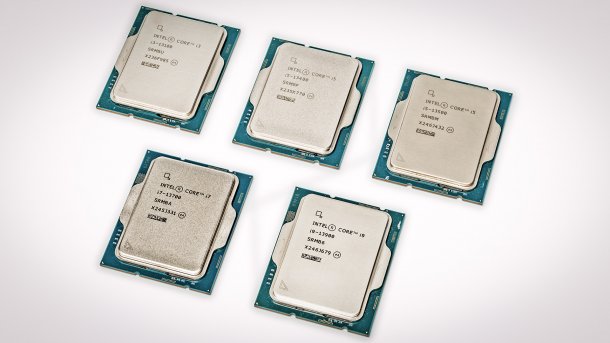Almost all Raptor Lake CPUs urgently need BIOS updates
Intel processors without the K suffix also degrade. Once the damage becomes noticeable, it is irreversible.

Apart from the Core i3, all Raptor Lake CPUs can become unstable due to excessive voltages.
(Image: c't)
The instability problems of the Intel Core i-13000 and Core i-14000 processor series affect more processors than previously assumed. Intel confirmed to The Verge that all desktop models with a Thermal Design Power (TDP) of 65 watts and more have the underlying problem.
This includes all models in the Core i5, i7 and i9 classes, i.e. all processors from the Core i5-13400 and Core i5-14400 upwards, including the F versions. So far, the focus has been on the K-types with a TDP of 125 watts – presumably the ageing effects occur more quickly there due to the generally higher voltages.
Videos by heise
In the case of the Core i3, Intel typically uses older Alder Lake chips (originally introduced as Core i-12000), which should generally run without errors.
A bug in the microcode – of the processors' firmware – causes CPU voltages to be too high, which causes premature ageing effects. As a result, the processors cannot keep their clock frequencies stable; in the worst case, this can lead to crashes in games and applications. BIOS updates with repaired microcode should be released soon by all mainboard manufacturers.
Anyone affected will have to replace the CPU
Intel also confirms that the BIOS updates will not repair damage that has already occurred. This means that anyone who has instability problems with their own processor will have to replace it in order to fix them. If the retailer does not cooperate, users should contact Intel support directly.
In all other cases, Intel is confident that BIOS updates will be released on time and that the increased voltages will not have any noticeable long-term consequences. The chip manufacturer is currently leaving open whether the warranty period should be extended due to the problem – to protect against long-term damage that could occur in a few years. The company is not initiating a general recall.
Intel is currently examining ways of easily identifying affected processors. In the best case scenario, a tool would do this automatically, for example by logging the clock frequencies for certain calculations.
Empfohlener redaktioneller Inhalt
Mit Ihrer Zustimmung wird hier ein externer Preisvergleich (heise Preisvergleich) geladen.
Ich bin damit einverstanden, dass mir externe Inhalte angezeigt werden. Damit können personenbezogene Daten an Drittplattformen (heise Preisvergleich) übermittelt werden. Mehr dazu in unserer Datenschutzerklärung.
(mma)